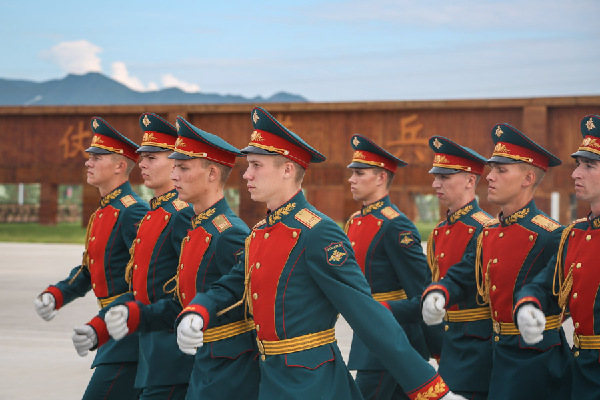European experts' view of China's role in WWII
- By Liu Zuokui
 0 Comment(s)
0 Comment(s) Print
Print E-mail China.org.cn, September 1, 2015
E-mail China.org.cn, September 1, 2015
|
|
|
Russian soldiers are conducting a training session for the Sept. 3 military parade at a training base in Beijing, China on Aug. 26, 2015. [Photo: CRIENGLISH.com/Cui Chaoqun] |
For most central and eastern European countries, World War II is still fresh in the memory, as their postwar fate has been closely linked with the conflict and has been greatly determined by big powers.
Initially, international patterns divided Europe into two parts, with central and eastern European countries drawn into the socialist camp. After the disintegration of the former Soviet Union, central and eastern European countries began to speed up their return to the European family. Most are now members of the European Union (EU) or may soon join. The later part of the collective memory has become important to their national development.
In regard to China's role in WWII, comments from think tanks in central and eastern countries are mainly based on the following three lines.
Firstly, for people without basic knowledge, it's essentially impossible for them to have an affirmation and recognition of China's functions during the war, even for many senior history professors.
Secondly, for people who have some knowledge of China's role in the war but have been strongly influenced by negative Western media reports, their comments are not relatively objective. For example, some scholars think the military parade that will be held in Beijing's Tian'anmen Square on September 3 in honor of the 70th anniversary of the Chinese people's victory in their War of Resistance against Japanese Aggression and the World Anti-Fascist War is simply a means for a totalitarian state to illustrate its strength.
Thirdly, for those people who have a better understanding of the history of that period, they can give a relatively fair and objective evaluation of China's role and functions.
Malksoo Lauri, director of Estonia's Foreign Policy Institute, said that China undoubtedly made a huge sacrifice for WWII and was one of the more notable victims. It experienced a similar fate to that of Eastern European countries in the war, but it has been able to independently regain its power.
China's great contribution to victory in the anti-Fascist war was in eroding Japan's strength leading to its ultimate surrender. Undoubtedly, China actively seized the post-war opportunity to gradually become a big power, moving from victim to active participant in international affairs.
As for the reason that many central and eastern countries won't come to boost the upcoming military parade held in Beijing, Lauri offered the following explanations.






